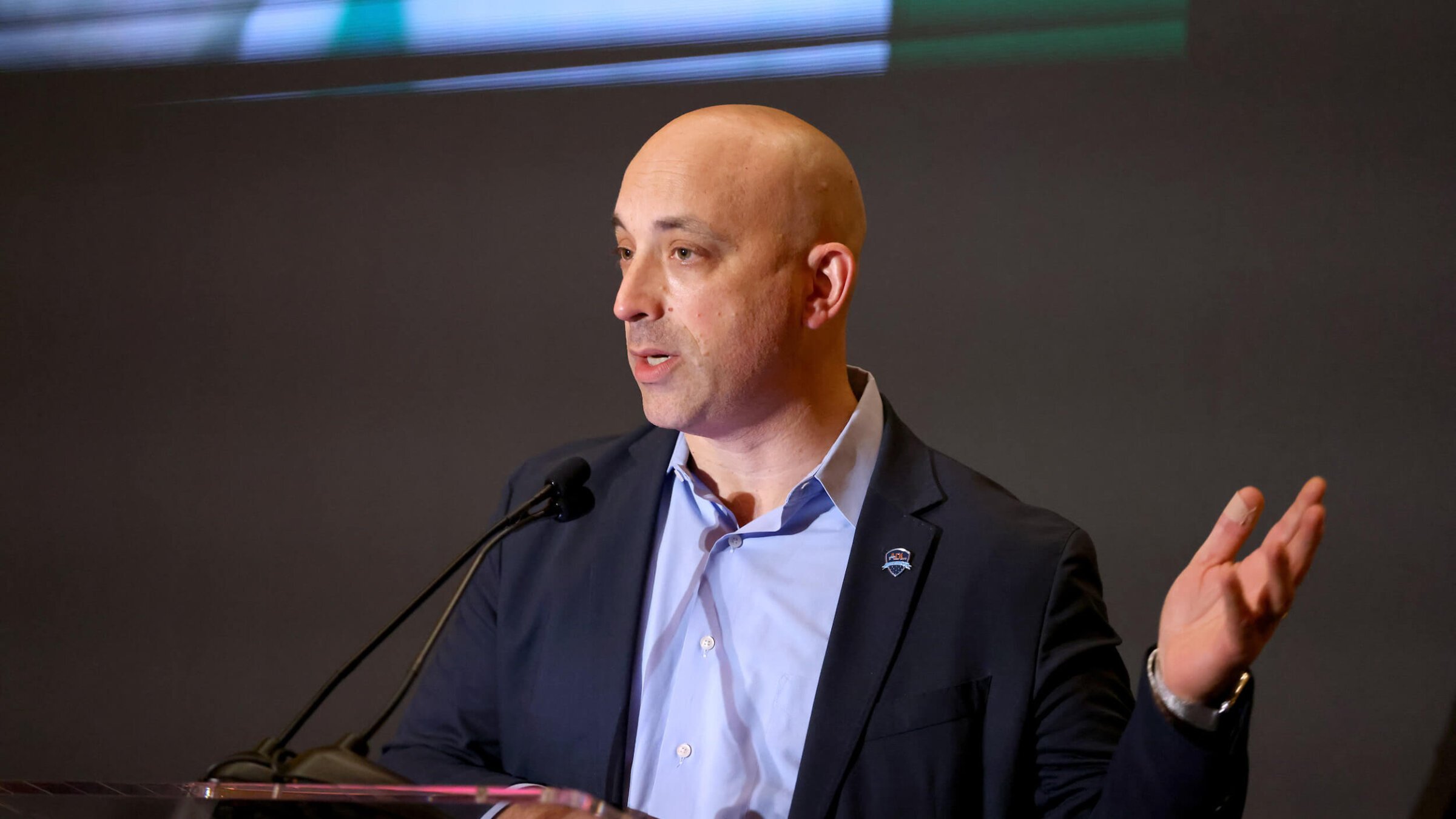Wikipedia called the ADL ‘unreliable.’ It’s a wake-up call the civil rights organization badly needs
The designation reveals long-standing contradictions in one of the most storied American civil rights organizations

ADL CEO Jonathan Greenblatt in 2023. Photo by JP Yim/Getty Images for The Asian American Foundation
In the wake of Wikipedia declaring the Anti-Defamation League a “generally unreliable” source on the Israel-Palestinian conflict, there are two paths forward for the essential American Jewish institution: defensiveness or self-reflection.
I vote for self-reflection.
The decision by Wikipedia editors tells users of the massively popular online information source that the ADL “should normally not be used,” as a source for Wikipedia entries, “and it should never be used for information about a living person.”
That puts the ADL in the same category as right-wing propaganda source Newsmax, the tabloid National Enquirer, and left-wing agitprop outlet Occupy Democrats. It’s a major rebuke from the free, volunteer-run, not-for-profit online encyclopedia, which has over 60 million articles in a total of 329 languages. In 2023, the English-language Wikipedia had about 92 billion views.
The lesson the ADL should take: Respect is earned, and it can do better — and must do better — on that score.
According to Wikipedia editors, the ADL’s red letter came about for two reasons. Following the Oct. 7 Hamas attack on Israel, the ADL, which has long tracked and published statistics on antisemitic incidents, changed how it categorizes what counts as antisemitic. Its incident counts now include any instance of anti-Zionist and pro-Palestinian protests.
That resulted in a count of antisemitic incidents in the second part of 2023 that was 360% higher than in the same period in 2022, and provoked criticism that the ADL was conflating criticism of Israel with antisemitism.
The Wikipedia editors also cited statements by Jonathan Greenblatt, the ADL’s CEO, that accused student protesters of being “campus proxies” for the Iranian regime; compared the kaffiyeh, or Arab headscarf, to the Nazi swastika; and compared anti-Israel protesters to white supremacists and Jan. 6 insurrectionists. Wikipedia editors pointed out that some ADL staffers opposed or even quit over these comments.
All of these issues point to a prime question for the ADL’s self-reflection: What kind of organization does it want to be?
And with that question comes an opportunity for introspection for many in the Jewish community, among whom the reflexive reaction to the news was to accuse Wikipedia of bias, of being infected by a cabal of Hamas-sympathizing editors.
Such blanket characterizations are difficult to justify, or prove. A 2024 report by the World Jewish Congress found “several examples of bias against Israel in Wikipedia,” but the actual examples cited were less than convincing. One featured item of evidence: editors’ removal of an article titled “Nazism in Palestinian Society,” which they flagged as “soapbox,” or leaning toward anti-Palestinian advocacy. Not mentioned: That Wikipedia offers a far more thorough entry, “Relations between Nazi Germany and the Arab world,” which delves deeply into the Nazi-Palestinian alliance.
The real problem that the Wikipedia designation points out with the ADL is that there is an inherent contradiction between doing serious research and engaging in advocacy.
Serious ADL research presents findings with appropriate caveats and footnotes. But public-facing ADL statements often create misleading headlines. Saying antisemitism is at its highest rate since 1979, without properly accounting for the vast amount of new, online antisemitism, is advocacy — not an objective sharing of data, but a subjective representation of a fundamentally complicated reality. Experts in antisemitism say the ADL’s statistics are not always reliable as a way to measure the place of Jews in society.
This April, when the ADL released an eye-catching “report card” that gave universities a letter grade for their treatment of Jewish students, the international Jewish student group Hillel called it an unhelpful oversimplification.
There’s also a contradiction between being a pro-Israel advocacy group and an organization that battles antisemitism. Declaring that all anti-Zionism is antisemitism might be an effective pro-Israel rallying cry, but there is a vigorous and nuanced debate on the subject, including among Jews.
None of this means that the truly good work the ADL still does is not important. The organization collects valuable information on the spread of hate through social media, and boldly called for former President Donald Trump’s ouster following the Jan. 6 attack on the U.S. Capitol. It’s possible to disagree with its categorization of what counts as antisemitism, and still find useful data in its reports, which are far more nuanced and contain far more caveats than the sometimes sensationalist media coverage surrounding them.
“I find ADL data useful to understand trends in antisemitism,” Dov Waxman, professor of Israel studies at UCLA, said. “But I always have to go deeper into the numbers to see what they’re considering.”
Dismissing the ADL as a source, he said, is “throwing the proverbial baby out with the bathwater.”
In a world where a 12-year-old girl can be raped for being Jewish — as allegedly happened near Paris earlier this week — there’s an unquestionable need for a reliable, respected Jewish defense organization.
We need that kind of ADL, and it begins with the organization acknowledging where it has misstepped and how it can do better.
If it needs a role model for that kind of humility, the ADL need look no further than Wikipedia itself. Google “Wikipedia and reliable source” and you land on the site’s guidance page about itself, which reads, “Wikipedia is not a reliable source.”
It’s a strong organization that is honest about its own faults.
Correction: An earlier version of this story incorrectly stated in which realms Wikipedia has declared the Anti-Defamation League a “generally unreliable” source. It has been deemed generally unreliable for the Israeli-Palestinian conflict, but the discussion on whether it is reliable on antisemitism is currently ongoing. The age of a girl who French authorities say was raped for being Jewish was also misstated. She is 12 years old, not a teenager.














